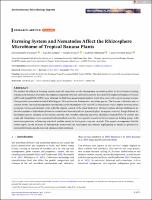| dc.contributor.author | Colagiero, Mariantonietta | |
| dc.contributor.author | Pocasangre, Luis | |
| dc.contributor.author | Ciancio, Aurelio | |
| dc.contributor.author | Pentimone, Isabella | |
| dc.contributor.author | Rosso, Laura Cristina | |
| dc.date.accessioned | 2025-07-17T21:55:53Z | |
| dc.date.available | 2025-07-17T21:55:53Z | |
| dc.date.issued | 2025-07-02 | |
| dc.identifier.uri | https://repositorio.catie.ac.cr/handle/11554/13318 | |
| dc.description.abstract | We studied the effects of farming systems and soil nematodes on the rhizosphere microbial profiles in three banana farming systems (conventional, barbecho and organic) compared with non-cultivated controls. Bacterial 16S Amplicon Sequence Variants (ASV) and fungal ITS1-2 OTUs were obtained by NGS from experimental fields in Costa Rica, each with a given farming system. Plant-parasitic nematodes included Meloidogyne, Helicotylenchus, Radopholus, and other species. The banana cultivation and, to
a minor extent, the field management type influenced the rhizosphere ASV and OTUs abundances, with a higher diversity found
in organic versus conventional crops, with the organic control as the most biodiverse. Diversity indices showed differences for
the total number of individuals (lowest in conventional banana) and rare species (highest in organic controls). Fungi differed for
the highest species richness in the organic controls. Soil variables affecting microbial abundance included low Fe content and
acidic pH. Nematodes were associated with microbial taxa that were specific to each herbivore species or feeding group, with
omnivores/predators influencing microbial profiles mostly in the organic crop and controls. The organic management had the
lowest impact on the diversity of belowground nematodes and rhizosphere microbiome, highlighting its beneficial potential in
sustainable banana production and agroecosystem resilience. | es_ES |
| dc.format.extent | 23 páginas | es_ES |
| dc.language.iso | en | es_ES |
| dc.publisher | Wiley | es_ES |
| dc.relation.ispartof | Environmental Microbiology Reports | es_ES |
| dc.relation.uri | https://doi.org/10.1111/1758-2229.70155 | es_ES |
| dc.subject | Sistema de explotación||farming systems||sistema de exploração agrícola||système d'exploitation agricole | es_ES |
| dc.subject | Nematodo||nematodes||nemátodes||nématode | es_ES |
| dc.subject | Rizosfera||rhizosphere||rizosfera||rhizosphère | es_ES |
| dc.subject | Banano||bananas||banana||banane | es_ES |
| dc.subject | Diversidad de especies||species diversity||diversidade de espécies||diversité des espèces | es_ES |
| dc.subject.other | Sede Central | es_ES |
| dc.title | Farming System and Nematodes Affect the Rhizosphere Microbiome of Tropical Banana Plants | es_ES |
| dc.type | Artículo | es_ES |
| dc.identifier.status | openAccess | es_ES |
| dc.subject.sdg | ODS 12 - Producción y consumo responsables | es_ES |


